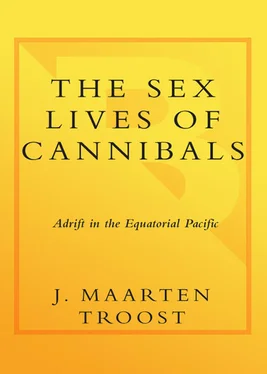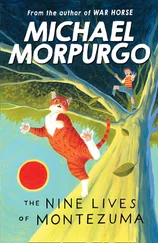J. Maarten Troost - The Sex Lives of Cannibals
Здесь есть возможность читать онлайн «J. Maarten Troost - The Sex Lives of Cannibals» весь текст электронной книги совершенно бесплатно (целиком полную версию без сокращений). В некоторых случаях можно слушать аудио, скачать через торрент в формате fb2 и присутствует краткое содержание. Город: New York, Год выпуска: 2004, ISBN: 2004, Издательство: Broadway Books, Жанр: Биографии и Мемуары, Путешествия и география, Юмористическая проза, на английском языке. Описание произведения, (предисловие) а так же отзывы посетителей доступны на портале библиотеки ЛибКат.
- Название:The Sex Lives of Cannibals
- Автор:
- Издательство:Broadway Books
- Жанр:
- Год:2004
- Город:New York
- ISBN:978-0-7679-1895-4
- Рейтинг книги:5 / 5. Голосов: 1
-
Избранное:Добавить в избранное
- Отзывы:
-
Ваша оценка:
- 100
- 1
- 2
- 3
- 4
- 5
The Sex Lives of Cannibals: краткое содержание, описание и аннотация
Предлагаем к чтению аннотацию, описание, краткое содержание или предисловие (зависит от того, что написал сам автор книги «The Sex Lives of Cannibals»). Если вы не нашли необходимую информацию о книге — напишите в комментариях, мы постараемся отыскать её.
The Sex Lives of Cannibals — читать онлайн бесплатно полную книгу (весь текст) целиком
Ниже представлен текст книги, разбитый по страницам. Система сохранения места последней прочитанной страницы, позволяет с удобством читать онлайн бесплатно книгу «The Sex Lives of Cannibals», без необходимости каждый раз заново искать на чём Вы остановились. Поставьте закладку, и сможете в любой момент перейти на страницу, на которой закончили чтение.
Интервал:
Закладка:
Flying Air Kiribati also ceased to fill me with dread, even after the CASA wrapped itself around a coconut tree while attempting an emergency landing on Abaiang. I’d traveled to Abaiang on a homemade wooden boat, just for fun, and as I stared at the CASA with its sheared wing, I thought, Ah well, at least we still have the Chinese plane .
At a funeral, I had a generous helping of chicken curry. In front of me lay the corpse. It was the custom in Kiribati to lay out the body of the deceased for three days before burial. Kiribati is on the equator. I had seconds.
Somehow, two years had passed since we first set foot on Tarawa, and in those two years I had become, in my own peculiar way, an islander. Certainly I was an I-Matang . But the world from which I’d arrived had become nothing more than an ever-receding memory. Sylvia too had adjusted to Tarawa. When I cut her hair, she no longer cringed in fear. She too had lost her vanity. When she took the electric razor we borrowed to shave my head, she was no longer troubled when her haircuts made me look like a skate-punk with unresolved anger issues. I, of course, couldn’t care less. No hair, no lice, I thought.
One day, she arrived home and declared: “I ran over another dog today.”
“What’s the tally now?” I asked.
“Four dogs and three chickens.”
“Didn’t you run over a pig?”
“No,” she said. “That was you.”
Shortly after she’d arrived on Tarawa, Sylvia swerved to miss wandering dogs. It was instinctual. But Tarawa is a small island, where every speck of land is occupied or used, and to stray from the road’s narrow lane was to risk the lives of humans, and no dog was worth that. And so now, like me, if she couldn’t brake safely, she simply ran over the dog. Perhaps she felt bad about the first dog, but by the fourth dog, she took it as she did any other bump on the road.
When her staff at work declared that one of the rooms in the office was haunted by malevolent spirits, Sylvia did what any manager wise to the ways of Kiribati would do. She organized an exorcism. Unsure whether the spirits were Catholic or Protestant, Sylvia had both a priest and a minister cast out the offending spirits. The staff were satisfied.
We found that we no longer had much in common with the newer volunteers and consultants to arrive on Tarawa. Every six months or so, another dozen I-Matangs arrived on Tarawa, replacing those whose contracts had ended, or more commonly, those I-Matangs who had been broken by Tarawa. The newcomers seemed dainty to us, naïve and ill-prepared for island life. Whenever I saw a newcomer, I had only one question: “Did you bring any magazines?”
“I’ve got a People ,” one said.
“Can I have it?”
The world on those pages, however, seemed utterly foreign to me. Instead, I found myself asking Bwenawa, “So, tell me a little more about this Nareau the Cunning character.”
Whenever possible, we traveled to North Tarawa or to one of the outer islands. The threat of being marooned no longer troubled us. In fact, we welcomed it, because if one can ignore the heat, and the scorpions, and the awful food, the outer islands of Kiribati are about as close to paradise as one can reasonably ask to experience in this life. I have mentioned the color in Kiribati, and I will mention it again. There is no place on Earth where color has been rendered with such intense depth, from the first light of dawn illuminating a green coconut frond to the last ray of sunset, when the sky is reddened to biblical proportions. And the blue… have you seen just how blue blue can get in the equatorial Pacific? In comparison, Picasso’s blue period seems decidedly ash-gray.
I admired the outer islanders. Though they had cloth, kerosene lanterns, and metal fish hooks, they survived on the atolls largely as their ancestors had, without any outside help at all. I was struck by how resistant to change these islands were. Inevitably, the handful of Western-style cinder-block buildings that were built on the islands for one grand purpose or another, stood derelict and forsaken, abandoned in favor of the customary wood and thatch homes and meeting places that were so perfectly suited to the equatorial climate. Traditional singing and dancing existed not for the benefit of package tourists, but as ways to amuse and engage the people themselves once dusk put a definitive end to the day’s work. The lagoons were clean, untampered with by clogging causeways and indestructible trash, and on the turquoise surface, men fished in skillfully crafted sailing canoes. It is no wonder that 85 percent of the thirty thousand people living on South Tarawa claim one of the outer islands as their “home island.” There remains a way of life on those islands that exists in very few places now. It is a way of life I greatly respect.
Even on the outer island though, the continental world intrudes in strange and inexplicable ways. Whoever unleashed Vanilla Ice on Butaritari ought to be severely punished. And no punishment would be too cruel for the miscreant who brought in “La Macarena.” But it is these glimmers of a world beyond the village that causes outer islanders to voice the lamentations of provincials everywhere— we’re bored —and many, too many, have chosen to depart their islands for the flickering lights of South Tarawa, where inevitably there is a relative or two whom they can bubuti . Every month, more people arrived on South Tarawa and more children were born. But the island did not get any bigger. The water did not become more abundant. And with too many people living on too little land, South Tarawa was becoming a filthy, noxious hellhole.
But it was our filthy, noxious hellhole. South Tarawa had become our home. We knew how to live here, on an island that had fallen off the map. Like the I-Kiribati, we had become fatalists. We no longer believed we could control our world. Each day was marvelously odd. One day I might be snorkeling with an enormous eagle ray, and the next I might be clutched over with stomach pain as the parasites that had made my intestines their home threw a party. A day might be wonderful or terrible, but it was never, ever boring. When I woke up in the morning, my first thought was always, What now? I am quite likely the world’s laziest adrenaline-junkie, and so living on Tarawa worked well for me. I didn’t have to do anything. Shit just happened on Tarawa.
And so when Sylvia’s contract ended, we weren’t sure what to do. Sylvia could have held on to the job until the end of time. She reported to no one except her donors. She had some good projects. The FSP staff were quite likely the most motivated people in Kiribati. She liked the job. As for me, well, the book wasn’t really working out. I learned that contrary to what they say, books do not write themselves. I thoroughly explored that avenue. Every day I said, All right, book, go write yourself . But the book wouldn’t budge. Instead, it asked me for a story. But I didn’t have a story, which, of course, is a problem when writing a novel.
This setback didn’t trouble me. Tarawa has a way of shattering professional ambitions. Of course, my professional ambitions could have been shattered by a hummingbird’s feather. Nevertheless, when your world is reduced to a sliver of land smack-dab in the middle of the Pacific Ocean, your aspirations tend to change. Once, I wanted to be a foreign correspondent for The New York Times . Now, I aspired to open a coconut with the same panache as the I-Kiribati.
We could continue to live here, I thought. I could teach. I could suckle at the teat of the foreign aid industry. There was plenty to do. More important, there was still much to experience in Kiribati. I had plans to do some long-distance windsurfing. I was fairly certain I could reach Abaiang. Maiana would have been more difficult, but I’d already found someone to accompany me in a boat. I wanted to learn how to build an I-Kiribati sailing canoe. I wanted to explore more of the outer islands. Abemama’s distinction for quality oral sex, for instance, needed further investigating. Perhaps now and then, to escape island fever, we could travel, Air Nauru permitting, to a larger land, such as Samoa.
Читать дальшеИнтервал:
Закладка:
Похожие книги на «The Sex Lives of Cannibals»
Представляем Вашему вниманию похожие книги на «The Sex Lives of Cannibals» списком для выбора. Мы отобрали схожую по названию и смыслу литературу в надежде предоставить читателям больше вариантов отыскать новые, интересные, ещё непрочитанные произведения.
Обсуждение, отзывы о книге «The Sex Lives of Cannibals» и просто собственные мнения читателей. Оставьте ваши комментарии, напишите, что Вы думаете о произведении, его смысле или главных героях. Укажите что конкретно понравилось, а что нет, и почему Вы так считаете.












